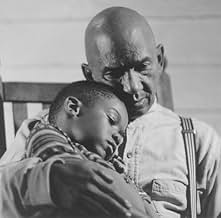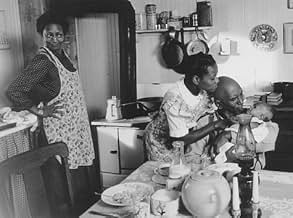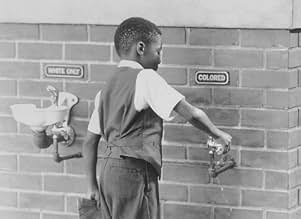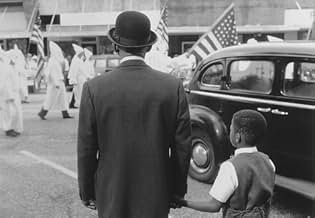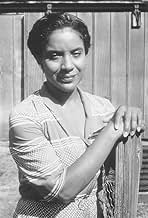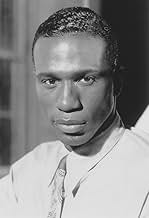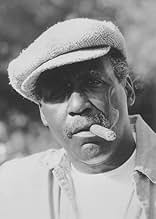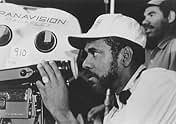Adicionar um enredo no seu idiomaA narrator tells the story of his childhood years in a tightly knit Afro-American community in the deep south under racial segregation.A narrator tells the story of his childhood years in a tightly knit Afro-American community in the deep south under racial segregation.A narrator tells the story of his childhood years in a tightly knit Afro-American community in the deep south under racial segregation.
- Direção
- Roteiristas
- Artistas
- Prêmios
- 3 vitórias e 2 indicações no total
Salli Richardson-Whitfield
- Miss Alice
- (as Salli Richardson)
Ray J
- Cliff (12 Yrs.)
- (as Willis Norwood Jr.)
Frank Hoyt Taylor
- Straw Boss
- (as Frank Taylor)
- Direção
- Roteiristas
- Elenco e equipe completos
- Produção, bilheteria e muito mais no IMDbPro
Avaliações em destaque
7calm
This was a very nice, scaled down version of how it really was in the Deep South. The movie did not even begin to depict the real horror Blacks faced each day. There was just a hint of the KKK, Jim Crow and the plantation mentality Blacks had to endure. I kept waiting for those historical, explosive events, we all knew to be the law of the land, to explode onto the screen, but it never happened.
Life was unbearable; Blacks were looked upon as animals and treated as such. I walked away from this movie feeling like life was almost a bowl of cherries.
I find it so odd that people are tired of hearing about the Black experience but never get tired of all the holocaust movies. 6 million Jews were slaughtered over a 6 year period (approx) -- hundreds of thousand Blacks were hung, beaten, raped, shot, humiliated and abused to death over a period of 150+ years, not to mention the suicides that took place on the slave ships in route to America. Admittedly, the holocaust was an atrocity, hopefully never to be repeated, while discrimination of Blacks is still a reality. Too bad there are no great movies that tell the Black Plight the way it should be told.
Life was unbearable; Blacks were looked upon as animals and treated as such. I walked away from this movie feeling like life was almost a bowl of cherries.
I find it so odd that people are tired of hearing about the Black experience but never get tired of all the holocaust movies. 6 million Jews were slaughtered over a 6 year period (approx) -- hundreds of thousand Blacks were hung, beaten, raped, shot, humiliated and abused to death over a period of 150+ years, not to mention the suicides that took place on the slave ships in route to America. Admittedly, the holocaust was an atrocity, hopefully never to be repeated, while discrimination of Blacks is still a reality. Too bad there are no great movies that tell the Black Plight the way it should be told.
It just touchdown little things that happened in the era didn't really stick to any things. And when it came to the very ending they could have delved into that a little more but they didn't. One thing that irritates me the most is that the lead character has a pretty terrible mother and it wasn't acknowledged in any way if this is a true story I wonder how he feels about the end result which sadly he probably like because it was an All-Star cast
I am very fond of this film, and I have had the opportunity to hear Clifton Taulbert speak in person. I think the point of the film is that while black people who had to endure much during the 100 years that followed the civil war they still managed to create many supportive communities. In addition there were good role models for young people like Clifton Taulbert. As a response to the undeniable oppression, the black community of Glen Allen, Mississippi, bonded and supported one another. It did, in fact, mean that their lives were made less miserable. They experienced joy and fellowship as well as oppression. They refused to take on victim-hood as an identity. At the same time, there was a vigorous challenge to the status quo. I don't think the movie is too sentimental, or inaccurate.
I have shown this movie to students many times and it has never failed to move them to a real concern for the condition of minorities. It reaches these students on an emotional level, and it gets them interested in learning more about the issue of human rights. That is no small feat.
I have shown this movie to students many times and it has never failed to move them to a real concern for the condition of minorities. It reaches these students on an emotional level, and it gets them interested in learning more about the issue of human rights. That is no small feat.
Tim Reid has not been that guy from WKRP' for some time now. And no, he wasn't Isaac on The Love Boat either. He still finds himself in too many schlocky TV movies, and weak situation comedies. One must pay the rent, and no one can argue with that.
More and more a champion of black film, he has been careful, deliberate in his choice of projects. Once Upon a Time When We Were Colored, elevates him, appropriately, as a serious filmmaker, black, white, or otherwise.
This is not a new' film, but it is a different approach. An insightful look into Afro-American existence during turbulent times, the focus is on the community, rather than the oppression, the individuals rather than the cause. The result is every bit as effective in getting the message across. You get more flies with honey '
Al Freeman Jr. gets a well-deserved opportunity to show that he's not just some kind of TV Morgan Freeman. His portrayal of Poppa, the family patriarch is wonderful and slighted unfortunately by the Academy. Even the Image awards overlooked him, preferring to bestow honor on the over-cooked and under-talented Phylicia Rashad, one of the only weak links in this strong cast. Bernie Casey and Richard Roundtree both play well against their macho-type.
Don't expect to be hit over the head with the ideas of this film. Just let it ease you on down the road, and, take a look around, every so often as you do.
More and more a champion of black film, he has been careful, deliberate in his choice of projects. Once Upon a Time When We Were Colored, elevates him, appropriately, as a serious filmmaker, black, white, or otherwise.
This is not a new' film, but it is a different approach. An insightful look into Afro-American existence during turbulent times, the focus is on the community, rather than the oppression, the individuals rather than the cause. The result is every bit as effective in getting the message across. You get more flies with honey '
Al Freeman Jr. gets a well-deserved opportunity to show that he's not just some kind of TV Morgan Freeman. His portrayal of Poppa, the family patriarch is wonderful and slighted unfortunately by the Academy. Even the Image awards overlooked him, preferring to bestow honor on the over-cooked and under-talented Phylicia Rashad, one of the only weak links in this strong cast. Bernie Casey and Richard Roundtree both play well against their macho-type.
Don't expect to be hit over the head with the ideas of this film. Just let it ease you on down the road, and, take a look around, every so often as you do.
"Once Upon a Time... When We Were Colored" is a nice movie. It's tame, calm, and largely uneventful which makes it nothing more than nice. It's about a Black boy's growing up in the South during the Jim Crow era. It's devoid of any real drama considering we're talking about Black folks trying to survive in the South. The movie has some fine actors in it and I believe they did the best they could with the script. Unfortunately, it was a weak script. I think this movie would've done well as a book, but not all books need to be made into movies.
Você sabia?
- CuriosidadesWhen Melvin tells the group of elders all the benefits of living up North, he says that Colored men even drive buses. Preacher Hurn replies "Shut yo' mouth!" Isaac Hayes wrote the theme to Shaft (1971), and Richard Roundtree played the titular character.
- Trilhas sonorasMaybe Tomorrow
Written and Performed by Lionel Cole
Principais escolhas
Faça login para avaliar e ver a lista de recomendações personalizadas
- How long is Once Upon a Time... When We Were Colored?Fornecido pela Alexa
Detalhes
Bilheteria
- Faturamento bruto nos EUA e Canadá
- US$ 2.291.255
- Fim de semana de estreia nos EUA e Canadá
- US$ 75.675
- 28 de jan. de 1996
- Faturamento bruto mundial
- US$ 2.291.255
Contribua para esta página
Sugerir uma alteração ou adicionar conteúdo ausente


